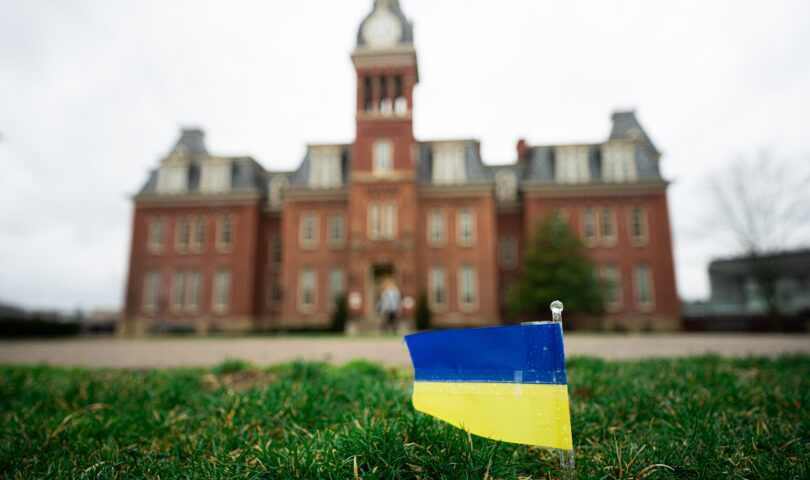Erik Herron’s interest and expertise is in Eastern Europe, and the WVU political professor was able to professionally deploy both during his studies 30 years ago.
On the way to earning his doctorate, he worked for an agency in the Detroit area that helped refugee families from trouble spots abroad regain their moorings in Michigan and elsewhere — with “refugee” being the operative word.
Several of them were from what was left of the then-newly unraveled Soviet Union, Herron recalled, and still others hailed from Bosnia and Herzegovina.
And those two countries, in particular, were still huddled under the overlapping shadows of Russian aggression and Russian rule.
“My specific responsibility was in refugee employment,” the professor said.
He taught a course — in Russian — on the fine-points of job-seeking, while also matching up refugee applicants with American employers.
Present-day Ukraine is now dealing with those shadows, and with the Russian invasion of its country rumbling into a third week, guerilla fighters are still turning back tanks.
Not the missiles, though.
To date, nearly 2 million Ukrainians have fled the shelling from the largest land offensive since World War II.
That means people adrift and in need, he said.
Refugees.
Looks good on paper?
During the last days of West Virginia’s 2022 legislative session last week, lawmakers supported a resolution saying the borders of the Mountain State were heretofore going to be open to anyone fleeing the fighting in Eastern Europe.
Which is good, Herron said — except for one thing.
West Virginia, he said, doesn’t have the social services to match its sentiment.
That’s because of the “substantial social infrastructure” required, the professor said, including housing and transportation.
There are the education and employment components, too, he said, as people who have lost their cultural identity try to dig in anew, in a place that’s truly foreign to them.
And, he said, the emotional side. Especially that.
“Refugees arriving from Ukraine are going to likely need additional services for trauma and mental health,” he said, “for adults and children.”
Translators, too, since not everyone speaks English, he said.
There are charitable organizations here, he said, including faith-based endeavors — just not on the scale that’s needed. Like a combat engineering crew building a bridge in a war zone, a lot of the social infrastructure would have to be put up fast.
Right now, the refugees of Ukraine are encamped in Europe. It’s not easy getting into the U.S. these days, with its wait-list and visa requirements.
Especially so, in West Virginia, said a Morgantown clergyman who publicly chided state policies on immigration during a candlelight vigil for the Ukrainian community last week.
‘We should be embarrassed’
During the gathering on WVU’s downtown campus, the Rev. Wes Bergen, who pastors at the Morgantown Church of the Brethren, urged people to pull out their cellphones and call 304-558-2000, which is the switchboard to Gov. Jim Justice’s office in Charleston.
Bergen, who is Ukrainian and whose grandparents fled the Russian Revolution for Canada 100 years ago, chided the governor, saying he set down policies that are overly restrictive, even with the recent resolution.
After the U.S. military pulled out of Afghanistan over the summer, West Virginia was one of four states in the nation that said it wouldn’t accept refugees.
“We should be embarrassed,” he said, adding that West Virginia and the nation were both built on immigrant strength and sacrifice. Ukrainians in Almost Heaven, he said, could make the place just that.
Herron agreed — but with that day-to-day caveat.
“From my experience, refugees enhance the communities where they resettle,” he said. “In a state like West Virginia, with a declining population, welcoming refugees could revitalize many neighborhoods.”
However, that brings it back to investment and resources — “From the government and community,” he said. “In West Virginia, this kind of social infrastructure would need to be developed.”
TWEET @DominionPostWV




